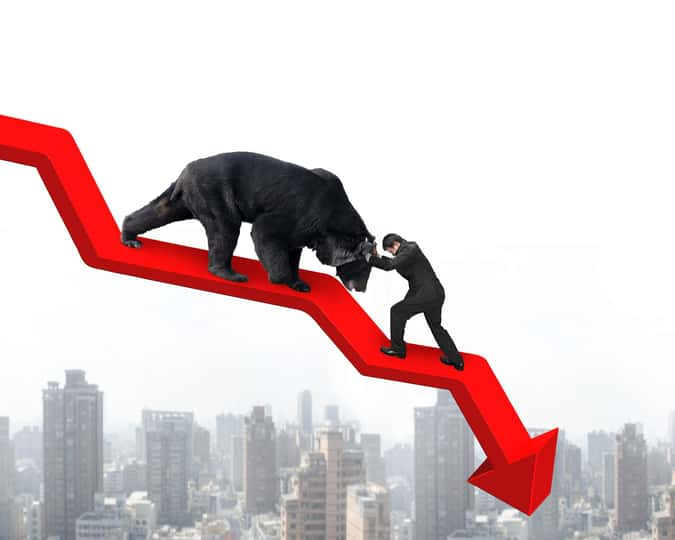(Please enjoy this updated version of my weekly commentary from the POWR Value newsletter).
I have to be honest. I was truly shaken by these back to back earnings misses from the 2 largest retailers. On the surface it SCREAMS RECESSION!
However, I knew there was a person I could turn to answers. I am referring to Sheraz Mian, Director of Research at Zacks. He and I worked together for many years where it was very clear there was no one on the planet who understood earnings trends better than he did.
So let’s start with the insights he shared with the world in this article: Making Sense of Target, WalMart and Disappointing Retail Results. Here is the key excerpt:
“It is tempting to interpret the Walmart and Target earnings disappointments as indicative of a moderation in consumer spending. Faced with the rising costs of fuel and other essentials, not to mention growing talk of a slowing economy in the face of rising interest rates, consumers would be justified to rein in their spending to some extent.
We see the Walmart and Target reports as still reflecting a very strong consumer spending environment.
Consumer spending will eventually slow down in response to Fed tightening, but we didn’t see much evidence of that in the Q1 earnings reports; neither from Walmart, Target or other consumer-centric companies.
Instead, these big-box retail leaders missed as a result of weak execution and failing to have the right merchandise in stores. Consumers didn’t buy the patio furniture at Walmart or appliances at Target, but they did plenty of shopping at Home Depot.
The challenge for Walmart, Target and other retailers is not only to have the correct merchandise, but also to deal with higher expenses related to freight, payroll and other items.
You can see this in the -24.4% decline in Walmart’s Q1 earnings even as its revenues increased +2.4%. For Target, earnings declined -44.9% while revenues were up +4%. The market expects these companies to pass on these higher expenses to either their customers or squeeze it out of their suppliers.
The market punished them for being surprised at the profitability hit even as they failed to protect their margins.”
After reading the above, I emailed Sheraz directly for more insights. For which he gave me a lengthy response that on the surface did not soothe my nerves:
“…inflation is a problem……for consumers as well as the companies. The Fed must be happy to see that WMT and TGT ate the cost increases, squeezing their margins, instead of passing those onto consumers.
What happens to inflation when WMT/TGT pass on those higher expenses to consumers? TGT said that they are spending $1 billion incrementally more this year on freight………which they didn’t pass on.
I have been looking for some early signs of weakness in consumer spending and I don’t think these reports or earlier ones from the likes of PG gave us such evidence.
That doesn’t mean it wouldn’t happen in three months or six months, but it hasn’t happened yet. The Fed wants to weaken the consumer, so it will happen (Don’t fight the Fed, remember), but it’s down the road.”
This response seemed a bit ominous too me…as if Sheraz was saying that a recession is right around the corner.
If so, then with investors often forecasting things well in advance, that the market as a whole is right to head into bear market territory now because of a looming recession. Here was his follow up response:
“There is no recession near term….meaning in the next 6 months….there is simply no signs at this stage that we are getting there.
The market is fearful of a recession and starting to price that in…..hence all the red prices.
Goldman says there is 30% recession risk, in 2023.
These are hard things to predict, but those odds look reasonable to me. This means that we will see more signs of recessionary weakness in the next couple of quarters.
Keep in mind that the Fed is data dependent, so it’s monetary policy outlook will adjust as those recessionary signs emerge in the next couple of quarters.
That is the soft-landing scenario, which is my view as well.
The economy weakens, the market’s inflation expectations come down, causing the Fed outlook to change. That’s when the market takes off. Till then, we are in trouble.”
Yes, that last part is ominous. But I read it as stocks will have a hard time making a meaningful bounce until there is proof of a soft landing allowing the Fed to adjust their outlook and policies.
Or to put it another way, we are still in wait and see mode similar to what we discussed last week as path #2 for the market. Here is that explanation again:
“Consolidate Here and Delay Bull/Bear Conclusion
Remember that relief rallies are typically +3-5% before testing lower once again. And that’s pretty much the size of the bounce we got Thursday afternoon through end of Friday.
So it’s not hard to imagine that we spend time in a trading range between the border of bear market territory at 3,855 and 4,100. Meaning that bulls and bears battle it out a bit longer before making the final determination if we do tumble into bear market territory or bull re-emerges.
We all would prefer the latter choice. And can even make logical presentations showing why that is the more likely outcome.
Unfortunately we do have to appreciate that the combination of high inflation and hawkish Fed is not the most stock friendly environment. Not a guarantee of a bear market…but fertile soil that could support the growth of bearish conditions.
Add it all up and we are not that far off the divergent paths discussed last week. And that keeps us in wait and see mode.”
Wait and see mode = that just like the Fed we are data dependent to change our course of action depending on what happens next in the economy, sentiment, price action etc. But for now our course is that risk and reward are fairly well balanced at this time.
Don’t get too much more aggressive in case market does devolve into bear market.
Don’t get too much more defensive in case new bullish catalysts emerge with a meteoric bounce ensuing.
Just hold tight for now.
Portfolio Update
The S&P 500 has fallen -18.15% this year. However, that is a far cry from what is happening to the average investor. This Israeli FinTech firm, TipRanks, actually measures the performance of over 500,000 investors through their industry best Smart Portfolio feature.
What their analysis shows is that so far this year the average investor has actually endured a -36.84% devastation to their portfolios.
In that light I hope you are pleased with our more modest -6.37% decline. According to TipRanks that puts us in the top 8% of all investors this year. (And my Reitmeister Total Return portfolio is in the top 1.2% of all investors).
What To Do Next?
If you’d like to see more top value stocks, then you should check out our free special report:
What makes these stocks great additions to any portfolio?
First, because they are all undervalued companies with exciting upside potential.
But even more important, is that they are all Strong Buys according to our coveted POWR Ratings system. Yes, that same system where top-rated stocks have averaged a +31.10% annual return.
Click below now to see these 7 stellar value stocks with the right stuff to outperform in the coming months.
All the Best!
Steve Reitmeister
CEO StockNews.com & Editor of POWR Value trading service
Want More Great Investing Ideas?
SPY shares closed at $389.63 on Friday, up $0.17 (+0.04%). Year-to-date, SPY has declined -17.71%, versus a % rise in the benchmark S&P 500 index during the same period.
About the Author: Steve Reitmeister

Steve is better known to the StockNews audience as “Reity”. Not only is he the CEO of the firm, but he also shares his 40 years of investment experience in the Reitmeister Total Return portfolio. Learn more about Reity’s background, along with links to his most recent articles and stock picks. More...
More Resources for the Stocks in this Article
| Ticker | POWR Rating | Industry Rank | Rank in Industry |
| SPY | Get Rating | Get Rating | Get Rating |
| .INX | Get Rating | Get Rating | Get Rating |
| DIA | Get Rating | Get Rating | Get Rating |
| IWM | Get Rating | Get Rating | Get Rating |
| QQQ | Get Rating | Get Rating | Get Rating |






